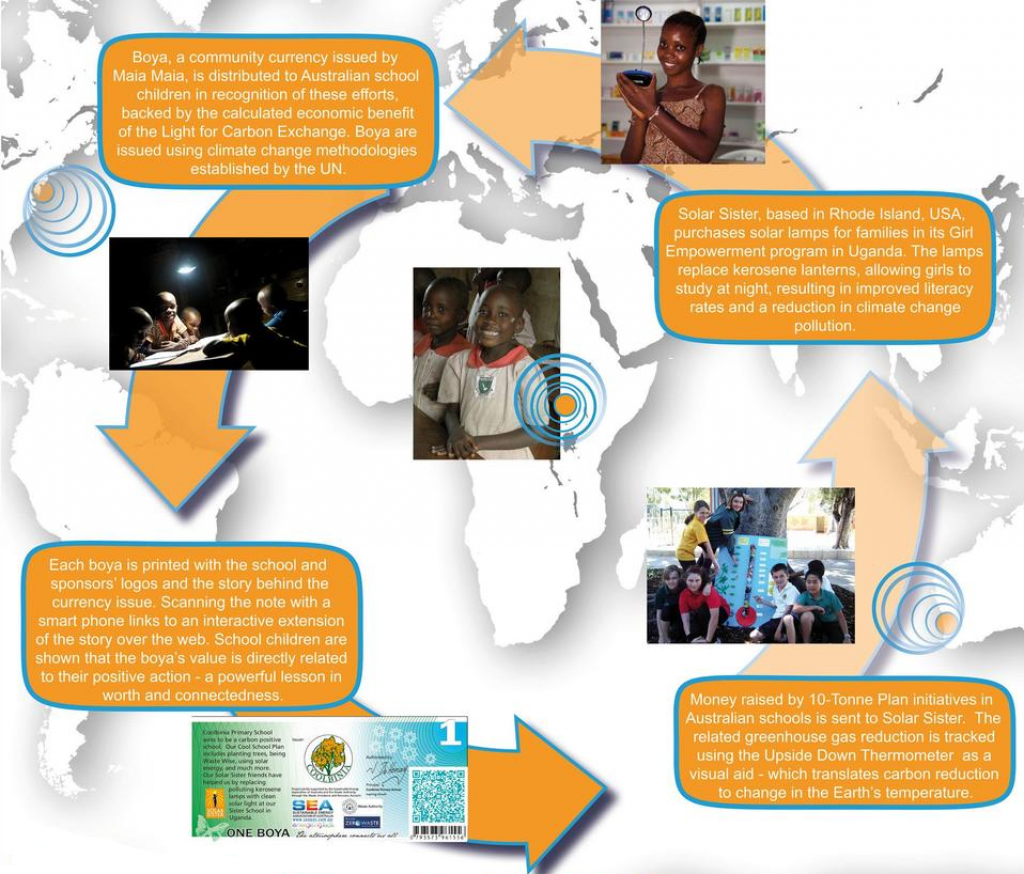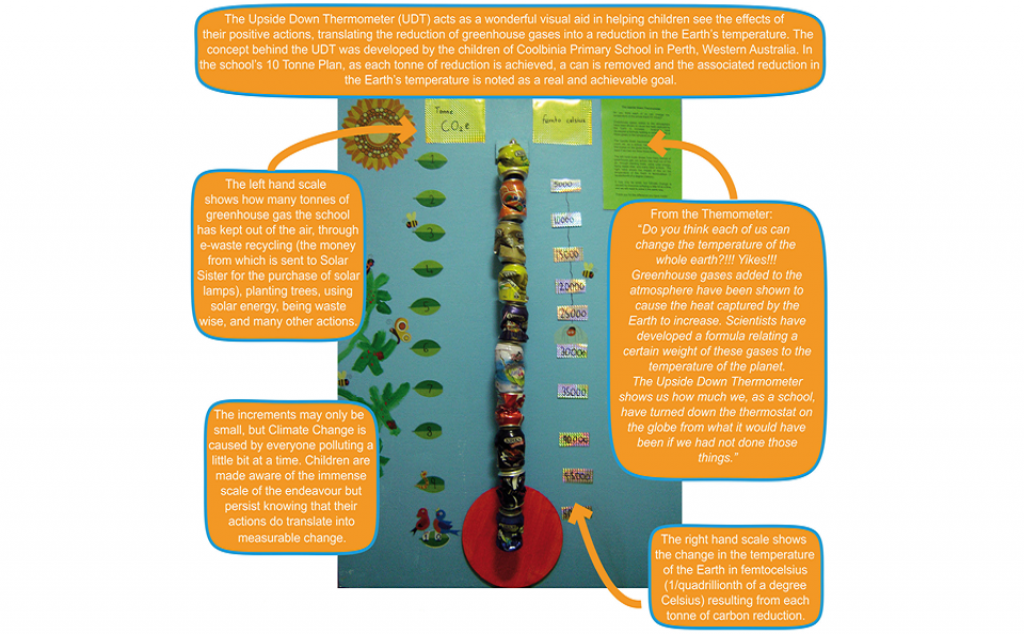A school and community case study: carbon emissions reduction at Coolbinia PS
Coolbinia Independent Public School is situated in metropolitan Perth, with approximately primary 450 students (Kindergarten to Year 6) from a variety of ethnic backgrounds.
Project lead: Elaine Lewis, Cross-Curriculum Coach
Scope of sustainability project: In 2011 Coolbinia expanded its classroom-based sustainability activity to a whole-school project by making carbon emission reduction plan. The 10 Tonne Plan engaged the wider community through activities such as the local coffee shop recycling its coffee grounds in the school garden, and developed international partnerships by fundraising for solar lanterns in Uganda and India.
Vision and process:
The project aimed to reduce greenhouse gas emissions through a cross-curriculum, whole-systems thinking approach to education for sustainability. It started in 2011 with a 10 Tonne Plan to reduce greenhouse gas emissions by 10 tonnes in one year.
This was easily achieved by a range of energysmart (e.g. installing solar panels and replacing polluting kerosene lanterns with solar lanterns), wastewise (e.g. worm farming/composting and Nude Food lunches), waterwise (e.g. tap/leak checks and using rainwater tanks), biodiversity (e.g. veggie gardens and tree planting) and travelsmart (e.g. Fume Free Fridays and Walk Over October) actions across the whole school.
Each class had a responsibility in the project plan: for example, Year 6 focused on energysmart actions. In 2012 the school adopted a 50-tonne target, followed by a 100-tonne target in 2013. Our current target is a 200-tonne plan to reduce greenhouse gas emissions by 200 tonnes in eighteen months.
http://www.coolbiniaps.wa.edu.au/files/Webnews%20Sept%20and%20Oct%2014.pdf
The school achieved the 10 tonne plan by working with local businesses (e.g. lawn mowing provided cuttings and a coffee shop donated coffee grounds), an international organisation providing solar lanterns (Solar Sister) and a local association to help us calculate our greenhouse gas emissions (Maia Maia Project Association). Another local school joined us for the 50 tonne plan, while subsequent plans involved the local secondary school and other businesses (e.g. book café) and organisations (e.g. Pollinate Energy).
The project was supported by the school through its inclusion in the school’s Business Plan, a part time (one to two days per week) teacher/coordinator employed by the school, a sustainability committee (staff, students, parents and wider community members); teachers taking on class rosters for different tasks (e.g. Year 5 travelsmart actions) and support from the wider community (e.g. businesses and associations). A local bushcare group donated tree seedlings, and the project also received important funding support to, for example, establish garden beds and install solar panels. These were vital contributions to its success.
v1.2.02.png

Outcomes:
- An environmental accountant calculated and documented resource savings in all aspects of the eco footprint – energysmart, wastewise, waterwise, biodiversity and travelsmart.
- Materials and infrastructure were developed at the school – demonstrated by new gardens, playgrounds and resources (e.g. energy use and water testing equipment). These were documented in regular school website news.
- There was enthusiastic participation by students, the school and communities – all stakeholders worked together contributing to the ongoing success of the project.
- There was obvious student learning and engagement – demonstrated by actions (e.g. fundraising and travelsmart) and products (e.g. a student book about the school bushland that incorporated a wide range of learning areas, cross-curriculum priorities and general capabilities).
- Our greenhouse gas emission reduction targets were progressively achieved and confirmed by an external environmental accountant.
Reflections:
Facilitators/enablers: School leadership and community support; access to funding support (school-based, grants, in-kind); understanding of whole-systems thinking (supported by relevant professional learning and engagement); ‘champions’ (including students, staff, parents, volunteers, partners).
Challenges: Keeping all stakeholders informed through a variety of communication strategies; reinforcing the importance of contexts within teaching and learning to ensure that all staff contributed to the school vision as part of their every day work; and maintaining commitment with personnel changes.
Recommendation: This ongoing carbon reduction/climate change action project is an effective strategy for bringing together the whole school community and beyond, in a whole-systems-thinking approach. If this project resonates with you, consider how it could become a reality in your own school – a 5, 10, 20, 50, even 200 tonne plan could become a reality based on your school’s context, including its interest, enthusiasm, size and resources.
Resources:
Carbon Kids http://www.csiro.au/en/Education/Programs/Sustainable-Futures
Cool Australia http://www.coolaustralia.org
WasteWise Schools WA http://www.wasteauthority.wa.gov.au/programs/wws/
Scootle https://www.scootle.edu.au/ec/p/home
WA Sustainable Schools http://www.det.wa.edu.au/curriculumsupport/sustainableschools/detcms/navigation/about-the-initiative/
Canning River Eco Education Centre http://www.canning.wa.gov.au/General/welcome-to-the-canning-river-eco-education-centre.html
The WA Chapter of the Australian Association for Environmental Education (AAEE) http://www.aaeewa.org.au
Australian curriculum and/or state frameworks:
Cross Curriculum Priorities and related topics and ScOT Terms
Sustainability
Sustainability; Science; Scientific inquiry; Life; Ecosystems; Ecological sustainability; Sustainable development; Environmental management; Technology; Resource management; Global studies; Population; Society; Culture; Economics; Health; Wellbeing; Systems thinking; World views; Futures; Ethical behaviour; Social justice; Historical inquiry.
Aboriginal and Torres Strait Islander histories and culture
Society; Culture; Civilisation; Past events; Social history; Historical inquiry; Indigenous Australian peoples; Australian languages; Reconciliation; Native species; Aboriginal technologies; Torres Strait Islander technology; Indigenous foods; Indigenous medicine; Indigenous schools; Indigenous students; Indigenous teachers.
Australia’s engagement with Asia
Humanities; Asia; Society; Culture; Global studies; Human society; Civilisation; Philosophy; Politics; Population; Religion; Past events; Social history; World history; Historical inquiry; Scientific inquiry; Technology; Business and enterprise; Resource management; Economics; Research and development; Marketing; Industries.
General Capabilities:
Critical and creative thinking
Cognition; Thinking; Procedural thinking; Lateral thinking; Critical thinking; Reasoning; Deductive reasoning; Inductive reasoning; Creativity; Originality; Imagination; Information and communication technologies; Information management; Problem solving.
Ethical behaviour
Philosophy; Ethics; Bioethics; Business ethics.
Intercultural understanding
Humanities; Society; Culture; Global studies; Human society; Civilisation; Philosophy; Politics; Population; Religion; Past events; Social history; World history; Historical inquiry; Scientific inquiry; Technology; Business and enterprise; Resource management; Economics; Research and development; Marketing; Industries; Ethics; Collaborative problem-solving and decision-making; Communication.
Personal and social capabilities
Philosophy; Ethics; Collaborative problem solving and decision-making; Communication.
Literacy
Education; Language; Curriculum; Learning.
Numeracy
Education; Mathematics; Curriculum; Learning.
ITC capability
Information and communication technologies; Information management; Problem solving.
Learning Areas:
Science
Science understanding: Biological sciences; Chemical sciences; Earth and space sciences; Physical sciences.
Science as a human endeavour: Use and influence of science.
Humanities and the Social Sciences
Place; Environments; Sustainability; Conservation; Climate change; Collaborative problem-solving and decision-making; Communication.
The Arts
Education; Curriculum; Dance; Music; Drama; Media arts; Visual arts; Originality; Imagination; Communication.
